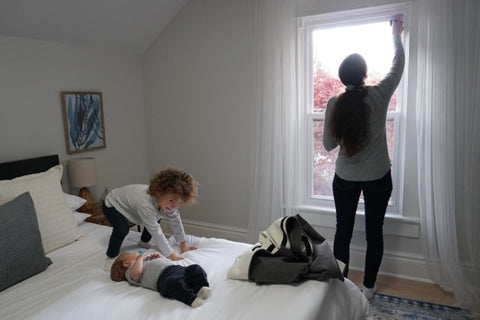Duration of the Newborn Stage
The newborn stage, typically lasting from birth to three months, is a crucial period for sleep development. During this time, your baby's sleep patterns will begin to emerge, and it's essential to establish a consistent sleep routine. By understanding the importance of this stage and the developmental milestones your baby will encounter, you can support their growth and ensure a smooth transition to the next phase of their life.
Newborns sleep a lot, averaging around 16-17 hours per day. However, their sleep is often broken up into shorter periods due to their need for frequent feedings. As they grow and their stomachs can hold more milk or formula, they will gradually start to sleep for longer stretches. It's important to be patient and attentive to their needs during this time, as the quality and quantity of sleep will have a lasting impact on their overall development.
Creating a consistent sleep routine is vital for your baby's development. This includes setting regular bedtime and wake-up times, incorporating calming pre-sleep rituals, and creating a sleep-conducive environment. By sticking to this routine, you will help your baby adjust to a sense of predictability and security, which in turn will lead to more restful and consistent sleep patterns as they grow.
Physical Development Milestones in Newborns
Sleep plays a critical role in newborns' physical, cognitive, and emotional development. Adequate sleep supports healthy growth, brain development, and immune system function. It also helps regulate hormones related to appetite and stress. By prioritizing your baby's sleep, you are laying the foundation for their overall health and well-being, which will serve them well throughout their life.
During the first three months, your baby will experience rapid growth and development. Some key milestones include lifting their head, following objects with their eyes, and beginning to smile. These milestones are important indicators of your baby's physical and cognitive progress, and ensuring your baby gets enough sleep will support these milestones and promote healthy development. By closely observing your baby's behavior and sleep patterns, you can help them reach their full potential and give them the best possible start in life.
Newborn Sleep: Common Concerns
Newborn health is a top priority for all parents, and it's important to be aware of common concerns that can arise during this stage. Sleep-related issues are a common challenge that many parents face, and it's crucial to address these issues early on to help ensure your baby develops healthy sleep habits.
One sleep-related issue that many newborns experience is colic. Colic is a condition that causes excessive crying and fussiness, often in the evenings. While the exact cause of colic is unknown, it's thought to be related to digestive issues or overstimulation. Addressing colic can be challenging, but creating a comfortable sleep environment and using calming techniques, such as swaddling or rocking, can help soothe your baby and promote healthy sleep.
Another common sleep-related issue is sleep regression. Sleep regression refers to a period when a baby who previously slept well suddenly begins to wake frequently during the night. This can be caused by various factors, such as developmental changes or illness. To address sleep regression, it's essential to maintain a consistent sleep routine and be patient with your baby as they adjust to new sleep patterns.
Developing sleep associations is another sleep-related challenge that can affect newborns. Sleep associations are habits or routines that a baby associates with sleep, such as using a pacifier or being rocked to sleep. While these associations can be helpful in promoting sleep, they can also create a dependency that makes it challenging for your baby to fall asleep without them. To prevent this, it's important to create a sleep routine that does not rely on external factors, such as a specific toy or pacifier.
Creating a comfortable sleep environment is key to tackling sleep-related challenges. Maintaining a room temperature between 65-70°F (18-21°C) can help ensure that your baby is not too hot or too cold while they sleep. Using a white noise machine to drown out background noise can also be helpful in promoting healthy sleep. Additionally, controlling light exposure using blackout curtains can help your baby's body recognize when it's time to sleep and when it's time to wake up.
Blackout Curtains: A Sleep Solution for the Newborn Stage
New parents are often surprised by how much light can disturb their newborn's sleep. Even small amounts of light can cause your baby to wake up or have difficulty falling asleep. This is because newborns have an underdeveloped circadian rhythm, the body's natural internal clock that regulates sleep-wake cycles. This makes it difficult for them to distinguish between day and night and can lead to frequent waking and disrupted sleep patterns.
One effective solution to help regulate your baby's sleep patterns is the use of blackout curtains. These curtains are designed to block out light and create a dark and soothing sleep environment, which can be especially important during the daytime. Blackout curtains help your baby produce more melatonin, the hormone that regulates sleep, which can result in more restful and longer sleep periods.
When choosing high-quality blackout curtains for your baby's room, it's essential to consider their material and fit. Look for curtains made from non-toxic materials to avoid any potential harm to your baby's health. Also, ensure that the curtains are of the right size and fit properly over the windows to block out as much light as possible.
It's essential to use blackout curtains consistently to help your baby associate darkness with sleep. Incorporate them into your baby's bedtime routine, such as closing them at naptime or bedtime. The use of blackout curtains can also be combined with other strategies, such as creating a consistent bedtime routine and using white noise machines, to establish healthy sleep habits for your baby.






